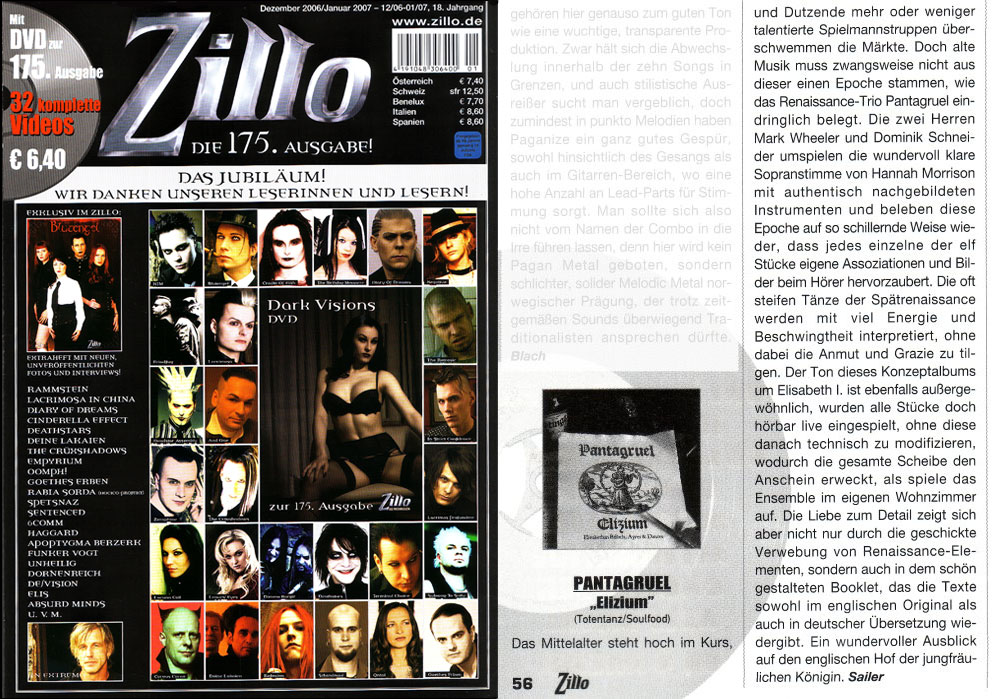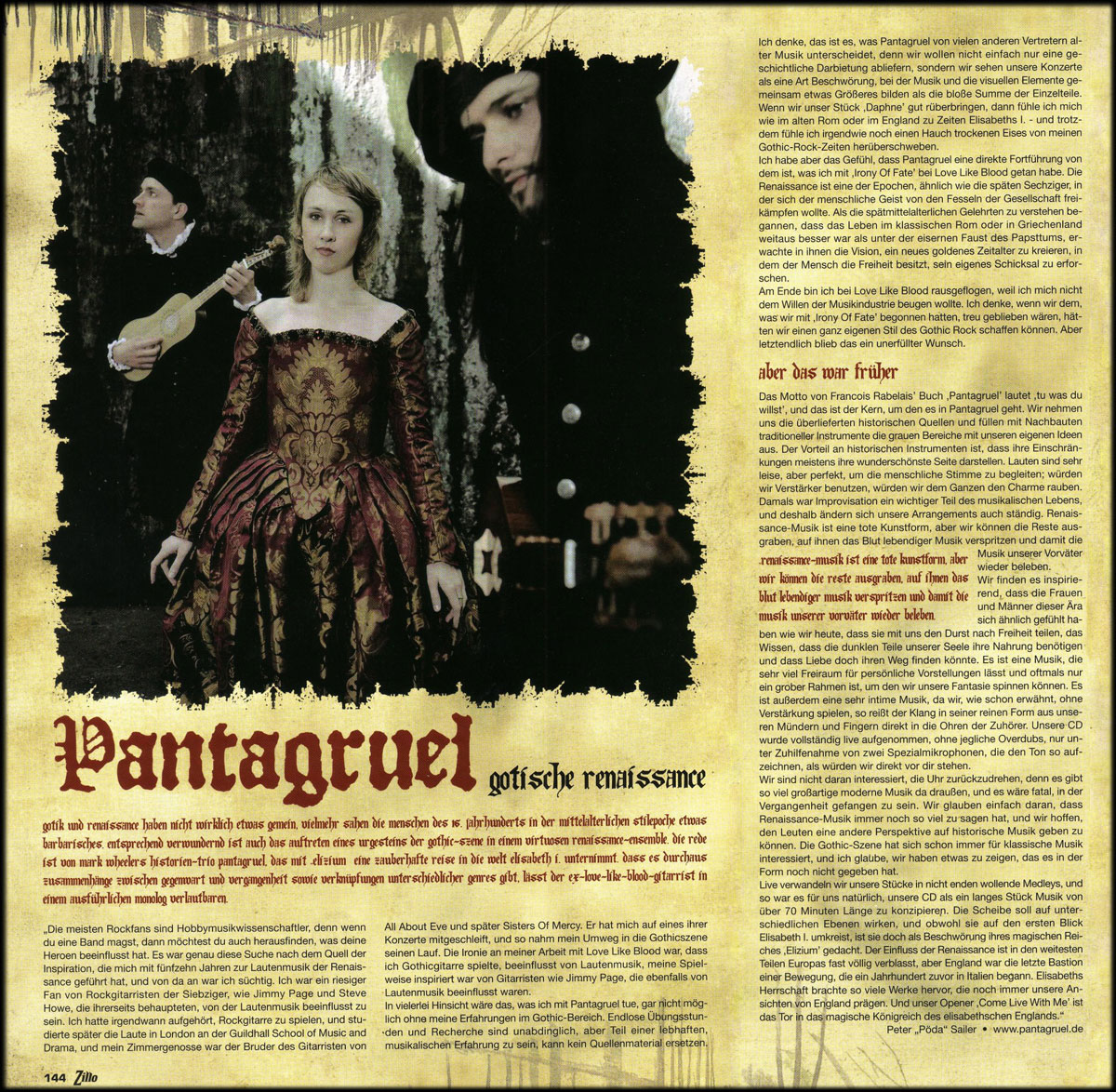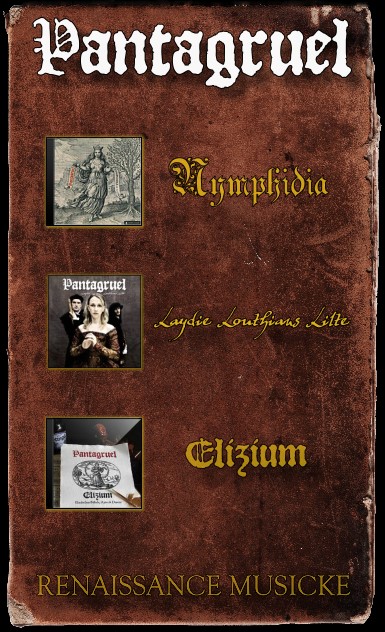|
 
Zillo December 2006
The middle-ages have recently become
increasingly trendy and dozens of more or less talented groups of
players are flooding the medieval markets. That early music does not
have to come from this period, is shown most vividly from the
renaissance trio Pantagruel. The two gents Mark Wheeler and Dominik
Schneider weave their way around the wonderfully clear soprano voice of
Hannah Morrison using authentic copies of historical instruments and
thereby bring to life this era in such an alluring manner, that each of
the eleven tracks brings delightful images to enchant the minds-eye of
the listener. The often rigid dances of the late renaissance are here
interpreted with such energy and vivacity, but without losing any of
their elegance or refinement. The sound of this concept album that
deals with Queen Elizabeth I. is also extraordinary; all of the pieces
are audibly recorded live, without any post production modification,
through which the whole disc gives the impression that the ensemble are
playing right in your own living room. The love for detail shows not
only in their cunning weaving of renaissance elements, but also in the
beautifully designed booklet, which contains both the original English
texts and German translations. This is a wonderful vision of the court
of England’s Virgin Queen.
Peter „Pöda“ Sailer

Gothic
and Renaissance do not seem to have much in common; in fact the 16th
century saw the medieval period as something quite barbaric. Therefore
it is even more surprising to see Mark Wheeler, one of the founding
fathers of the gothic scene performing in the virtuoso renaissance
ensemble Pantagruel, who with “Elizium” undertake an enchanting journey
to the realm of Queen Elizabeth I. In the following detailed monologue
the ex-Love Like Blood guitarist shows there are in fact links between
the past and present, and between the most diverse of musical genres.
“Most
rock fans are hobby musicologists, when you like a band; you want to
find out what influenced your heroes. It was this search for their
spring of inspiration that led me to renaissance lute music when I was
15 and I simply got hooked. I was a huge fan of 70’s rock guitarists
such as Jimmy Page and Steve Howe, who claimed to be influenced by lute
music. Eventually I stopped playing rock guitar and began to
study the lute in London at the Guildhall School of Music and Drama and
my room-mate was the brother of the guitarist from All about Eve and
later Sisters of Mercy. He dragged me along to one of his brother’s
gigs and my detour into the gothic scene began. The irony of my work
with Love Like Blood was that I was playing Gothic guitar influenced by
lute music and that Gothic guitar itself its roots in the playing of
guitarists such as Jimmy Page who were also influenced by Lute Music.
In
many respects what I am doing with Pantagruel would be impossible
without my experience in the Gothic scene, hours of practicing and
research are indispensable, but being part of a living musical
experience is something that no source material can substitute. I think
that is what makes Pantagruel different from many other early music
groups, we are not interested in just recreating an historical
performance, rather we see our concerts as invocations, where music and
the visual elements create something greater than the sum of it’s
parts. During a convincing performance of the Ballad
“Daphne” I feel I am in ancient Rome, Elizabethan England and somehow I
can still somehow smell a waft of dry ice from my Goth-Rock days.
I
have the feeling, that Pantagruel is a direct continuation of what I
did on the CD “An Irony of Fate” with Love Like Blood. The renaissance
is one of those eras similar to the late 1960’s when the human spirit
struggles to break free of the shackles that society places on it. When
late medieval scholars began to realise that life in classical Rome or
Greece had been a lot better than under the iron fist of the medieval
Papacy, it gave them a vision to create a new “Golden age” where man
had the freedom to explore his own destiny
But that was all in the past….
In
the end I got thrown out of Love Like Blood, because I didn’t accept
the compromises the music industry wanted to impose on us. I think that
if we have stayed true to what we had begun on “An irony of Fate”, we
could have created our own individual style of Gothic Rock. But in the
end it was not to be.
The
motto from Francois Rabelais’s Book “Pantagruel”, “Do what thou wilt”,
lies at the very core of our work. We take the surviving historical
sources and using copies of historical instruments fill in the grey
areas with our own ideas. The advantage of historical instruments is
that their “limitations” are often their most beautiful qualities.
Lutes are extremely quiet, but perfect for accompanying the human
voice; if we used amplification it would destroy so much of their
charm. Improvisation was an important part of musical life back then
and that’s why our arrangements are constantly changing. Renaissance
music is a dead art form; but we can dig up the remains, sprinkle the
blood of living music on them and thereby revive the music of our
forefathers.
We
find it inspiring to see that men and women of that era felt much the
same as we do today. That they shared the thirst for freedom, the
knowledge that the darker parts of our psyche need their nourishment
and that love will eventually find its way. It is music that allows a
lot of personal input, the pieces being often just a rough framework
around which we can let our fantasy run wild. It is also very intimate
music, as we play without any amplification, the music travels in its
purest form from our mouths and fingers into the listener’s ears. Our
CD was recorded completely live without any overdubs using a pair of
special microphones that capture the sound you would hear standing
directly before us.
We
are not interested in turning back the clock, there is simply so much
fantastic modern music out there, that it would be fatal mistake to get
trapped in the past. We simply believe that renaissance music still has
a lot to say and we hope we can give our audience a different
perspective on historical music. The Gothic scene has always shown an
interested in classical music and I think we are doing something that
hasn’t been offered to them before.
We
organise our pieces live into non-stop medleys, so it was natural for
us to conceive our CD as one long 70+ minute piece of music. The album
should work on many different levels and although at first glance it
seems to be centred on Elizabeth I, it is more an invocation of her
magical realm “Elizium”. The influence of the renaissance was fading in
most of Europe and England was the last bastion of a movement that had
begun in Italy over a century before. Elizabeth’s reign produced so
many works of art that still shape our view of England. Our opener
“Come live with me” is the doorway to this magical kingdom of
Elizabethan England.” Peter „Pöda“ Sailer
|
























